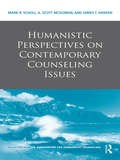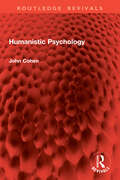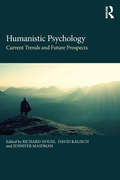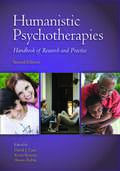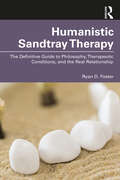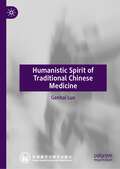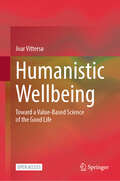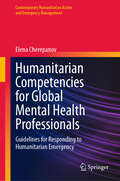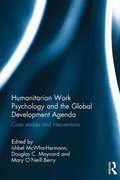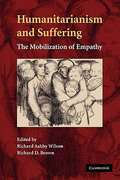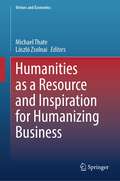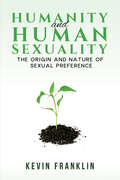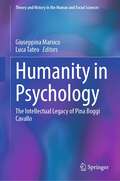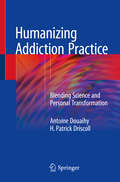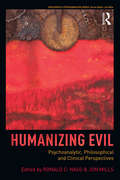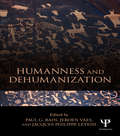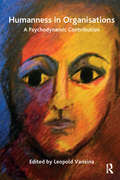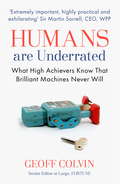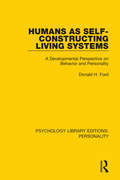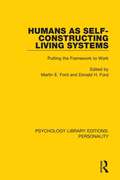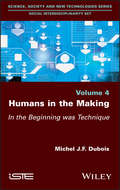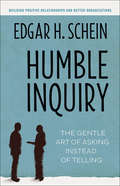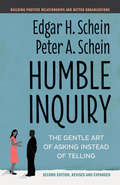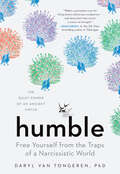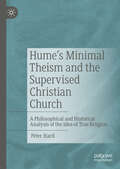- Table View
- List View
Humanistic Perspectives on Contemporary Counseling Issues
by Mark B. Scholl James T. Hansen A. Scott McGowanHumanism is considered by many to be the foundation for the values and practices of counseling. This book explores and presents current counseling issues from a humanistic perspective, providing a valuable resource for counselors and therapists seeking effective approaches, founded on humanistic principles, to use in their practice. Each chapter describes the significance of a specific counseling issue, reviews the humanistic literature on this issue, discusses the theoretical model provided by a humanistic perspective, and concludes with applications and implications for practitioners. Situations considered include, among others, marital/couples counseling, multicultural counseling, and healing trauma, all of which have been shown to benefit from the use of humanistic approaches. Applications in educational settings, such as addressing school violence, working with at-risk youth, and counseling in college and university settings, are also discussed. The book concludes with a section on uses of humanistic approaches in counselor education and training. After reading this book, practitioners will be inspired to advocate for counseling’s holistic and empowering approach to helping all individuals across the lifespan.
Humanistic Psychology (Routledge Revivals)
by John CohenFirst published in 1958, Humanistic Psychology opens with a consideration of the many different ways in which a system of psychology can be built. Professor Cohen takes an entirely different view from that which suggests that a knowledge of the brain will eventually tell us all we need to know about the mind. The qualities of human experience are peculiar to themselves and cannot be reduced only to the activities of the central nervous system.Psychology, it is then suggested, must begin with the meaning of experience from the ‘inside’. This meaning can be deciphered only in terms of the past which has shaped our minds and of the future which we envisage as beckoning us. Four fundamental themes are chosen to illustrate this conception of psychology: first, the successive stages of emotional and social maturation through which every normal child passes between birth and puberty; second, the personal and social significance of sensory experience; third, the individuality of thought and its social qualities. The fourth theme embraces three topics of more general interest- work and play, illness, and literature.Humanistic Psychology is intended to be an introductory text for the general reader as well As for professional students of psychology, psychiatry, philosophy and the social sciences.
Humanistic Psychology: Current Trends and Future Prospects
by Richard House, David Kalisch and Jennifer MaidmanThis book provides a thought-provoking examination of the present state and the future of Humanistic Psychology, showcasing a rich international contributor line-up. The book addresses head-on the current state of a world in crisis, not only placing the current conjuncture within a wider evolutionary context, but also demonstrating the specifically humanistic-psychological values and practices that can help us to transform and transcend the world’s current challenges. Each chapter looks in depth at a variety of issues: counselling and psychotherapy, creativity and the humanities, post-traumatic stress, and socio-political movements and activism. The book amply confirms that Humanistic Psychology is as alive, and as innovative and exciting, as it ever has been, and has tremendous relevance to the uncertainties that characterize the unprecedented individual and global challenges of the times. It celebrates the diverse and continuing significance of Humanistic Psychology by providing a robust and reliable roadmap for a new generation of counsellors and psychotherapists. In these richly diverse chapters will be found inspiration, pockets of resistance, mature critical reflexivity and much much more - a book accurately reflecting our present situation, and which is an invaluable addition to the psychology literature.
Humanistic Psychotherapies: Handbook of Research and Practice
by Kevin Keenan Dr. David J. Cain PhD Shawn RubinThis thoroughly revised update to the first edition highlights cutting edge research on the effectiveness of various humanistic psychotherapy approaches. Illustrative case examples containing vivid client–therapist dialogue demonstrate how to apply humanistic principles in practice. Humanistic psychotherapy is based on more than 70 years of psychological research, but there has been a surge of literature since the first edition of Humanistic Psychotherapies. This extensively updated volume highlights the flourishing evidence base for humanistic approaches, demonstrating that they are equal to or more effective than other therapeutic approaches. In fact, cornerstones of humanistic practice, such as therapist empathy and authentic emotional expression and experience, are essential to promoting positive client outcomes for non-humanistic practitioners as well. In addition to a general review of research, the contributors focus on specific approaches, including person-centered therapy, gestalt therapy, focusing-oriented therapy, existential therapy, emotion-focused therapy, relationship enhancement therapy, and child-centered play therapy. Also discussed are important therapist factors and client variables that contribute to effective psychotherapy. New findings are translated into practical guidelines for clinicians. Numerous case examples with vivid client–therapist dialogues illustrate how humanistic principles and approaches can be applied in actual practice—not just with individuals, but also with couples, families, and children. The final chapter synthesizes the entire volume with a proposed model for optimal humanistic psychotherapeutic practice, based on 20 simple premises drawn from the best evidence available.
Humanistic Sandtray Therapy: The Definitive Guide to Philosophy, Therapeutic Conditions, and the Real Relationship
by Ryan D. FosterHumanistic Sandtray Therapy: The Definitive Guide to Philosophy, Therapeutic Conditions, and the Real Relationship provides a comprehensive exploration of the underlying theory, necessary skills, and practical applications behind Humanistic Sandtray Therapy (HST) based on a person-centered gestalt model.This book takes a deep dive into a philosophically based system of sandtray therapy in which all elements of the HST approach are provided in great detail, from the nuts and bolts of creating a sandtray and structuring the experience based on client culture and counseling setting, to process-oriented issues.Written with a genuine human touch, invaluable materials such as an HST treatment manual and a weblink to videos of HST sessions with real clients are included to assist academics and researchers in designing HST treatment outcome studies.
Humanistic Spirit of Traditional Chinese Medicine
by Genhai LuoThis book aims to introduce in everyday language the profound culture and unique legacy of the ancient healing art with mesmerizing stories, allusions and anecdotes in the history of its evolution, handpicked from three perspectives, including contributions of master TCM practitioners, the nourishment of TCM by traditional Chinese culture, and the exchanges between TCM and its western counterparts. The vivid narrative of each section is complemented with elaboration of one related key TCM concept in a specific column. It is a brilliant reader for those interested in TCM and traditional Chinese culture.
Humanistic Wellbeing: Toward a Value-Based Science of the Good Life
by Joar VittersøThis open access book seeks to change the way we think about happiness and the good life. It starts ambitiously by exploring how the biological question, “What is life?” can be integrated with the philosophical question, “What is good?” It ends with a radical idea for how scientific reasoning can include a value-based theory of the good life. Anchored in basic knowledge about human nature, the new humanistic theory of wellbeing suggests that a life is good to the extent that it allows us to perform our humanness well. The theory further defines a well-performed humanness as the fulfilment of three universal human needs: the need for stability, the need for change, and the need to and for care. To reach this standpoint, the author critically examines major concepts in the wellbeing literature, such as values, happiness, life satisfaction, affect, hedonia, eudaimonia, and the good life. Based on these reviews, the author argues that a science of wellbeing cannot be strictly descriptive and value-free. A life should not be considered good only because it feels good or is thought of as good for the person living it. A good life must also be committed to a universal morality. Therefore, the humanistic theory of wellbeing suggests that it is good to like one’s life, but even better to like it for the right reasons.
Humanitarian Competencies for Global Mental Health Professionals: Guidelines for Responding to Humanitarian Emergency (Contemporary Humanitarian Action and Emergency Management)
by Elena CherepanovThis book provides a comprehensive guidance for mental health professionals to humanitarianism and humanitarian culture. When responding to disasters, wars, famines, political violence and other humanitarian emergencies, mental health providers join other multidisciplinary and multisectoral humanitarian actors coming from around the world and united by a common purpose of saving lives and eliminating suffering. This book orients globally minded mental health and human services providers to the professional and personal challenges they can face and equips them with core humanitarian competencies: the understanding of the context of humanitarian work, the knowledge of relief systems, and best practices. Familiarity with the guidelines and regulations is essential for establishing effective collaborations and conducting contextually appropriate and ethical interventions, avoiding duplication of services, minimizing fragmentation, and reducing risks for all involved. The recognition of tremendous differential power and the extreme vulnerability of people served call for the highest standards and integrity of conduct and practice as the price for an ethical indiscretion in a humanitarian emergency can be very high. Humanitarian competencies mitigate risks associated with aid work in the increasingly polarized and politicized world. This mentally and morally demanding environment emphasizes the importance of peer support, self-awareness and self-care to manage fantasies and prevent burnout. The book is written by a global mental health expert with over 20 years of experience responding to international humanitarian emergencies and teaching theory and practice of global mental health in academic settings. In this volume, Dr. Elena Cherepanov combines empirical evidence with academic rigor to share unique insights and original observations with mental health professionals interested in learning the nuts and bolts of humanitarian action. The author also reviews ethically questionable practices, emerging myths and misconceptions in global mental health work and suggests protocols for negotiating ethical and moral dilemmas in the humanitarian situation.
Humanitarian Work Psychology and the Global Development Agenda: Case studies and interventions
by Ishbel McWha-Hermann, Douglas C. Maynard and Mary O'Neill BerryIn recent years, a new movement has emerged within organizational psychology, transposing the established principles of the field onto arenas of more pressing humanitarian need, including the humanitarian treatment of all workers in all work settings. Humanitarian Work Psychology (HWP) stretches the parameters of the discipline to focus on regions, communities, and groups of workers that can potentially benefit most from its research and insights. Humanitarian Work Psychology and the Global Development Agenda is the first book to provide a collection of case studies of HWP in action. Edited by some of the leading scholars in the field, it benchmarks HWP against the developmental goals set out by the United Nations at the start of the century as the most pressing issues of our age, ranging from the eradication of extreme poverty and hunger and the achievement of universal primary education, to gender equality and empowerment, the reduction of child mortality, greater environmental sustainability and global partnership-building. Including findings from interventions conducted in Nigeria, India, Ghana, Hong Kong and Sierra Leone, the book examines how the latest research from organizational psychology can be used to support people working in developing economies, as well as in humanitarian work itself. The collection concludes with a section on how this exciting new field will develop in the future, particularly in reference to the forthcoming United Nations goals for global sustainable development. Humanitarian Work Psychology and the Global Development Agenda will be a fascinating read not only for all students and researchers of Organizational Psychology, but also those working and studying in the related fields of Development Studies, Environmental Sustainability, International Politics and International Economics.
Humanitarianism and Suffering: The Mobilization of Empathy
by Richard Ashby Wilson Richard D. BrownHumanitarian sentiments have motivated a variety of manifestations of pity, from nineteenth-century movements to end slavery to the creation of modern international humanitarian law. While humanitarianism is clearly political, Humanitarianism and Suffering addresses the ways in which it is also an ethos embedded in civil society, one that drives secular and religious social and cultural movements, not just legal and political institutions. As an ethos, humanitarianism has a strong narrative and representational dimension that can generate humanitarian constituencies for particular causes. The emotional nature of compassion is closely linked to visual and literary images of suffering and innocence. Essays in the volume analyze the character, form, and voice of private or public narratives themselves and explain how and why some narratives of suffering energize political movements of solidarity, whereas others do not. Humanitarianism and Suffering explores when, how, and why humanitarian movements become widespread popular movements. It shows how popular sentiments move political and social elites to action and, conversely, how national elites appropriate humanitarian ideals for more instrumental ends.
Humanities as a Resource and Inspiration for Humanizing Business (Virtues and Economics #7)
by László Zsolnai Michael ThateThis book highlights the relevance of the grand traditions of the humanities as an untapped resource for business-world problems. In a time where the humanities are viewed as in decline or in threat of collapse altogether, this book enacts and extends the best of the humanities toward prevailing challenges within the complex realities of our current cultural moment. The book presents how the humanities can contribute to humanizing business and management. It explores and discusses various ways to integrate the views and approaches of the humanities in business and management research, practice, and education responding to the unprecedented challenges of the Anthropocene. The relations between humanities and social sciences is also discussed, as models and theories of business and management are based on insights of social sciences. The book is an outcome of the “Humanities for Business” project of Princeton University Faith and Work Initiative, the European SPES Institute, Leuven, and the Business Ethics Center of Corvinus University of Budapest. It is of great value to researchers, students, policy makers and research institutions interested in using humanities for renewing and humanizing business and management.
Humanity and Human Sexuality: The Origin and Nature of Sexual Preference
by Kevin FranklinIn Humanity and Human Sexuality: The Origin and Nature of Sexual Preference, Dr. Kevin Franklin embarks on an extraordinary exploration of the human being, of mind, and their potential. Delving deep into themes of confusion and disorder, he unveils how a ‘trickster-mind’ can hinder an individual’s true potential for life and freedom. Drawing from his own profound experiences of childhood psychosis, which once seemed to destine him for a life overshadowed by schizophrenia and the threat of early suicide, Dr. Franklin defies expectations. This book ventures beyond traditional boundaries to examine the metaphysical aspects of psychological order, offering a unique perspective on the often-misunderstood concepts of societal and psychological disorders. Dr. Franklin’s insights extend into a scientific demonstration of the innate origins and nature of both heterosexual and homosexual preferences. Humanity and Human Sexuality: The Origin and Nature of Sexual Preference illuminates various fields - Philosophy, Religion, History, Science, Society, and Psychology - offering a revolutionary viewpoint on these disciplines. It challenges long-held beliefs and misconceptions, particularly in the realms of sexual identity, the gender and transgender discussion, and the complex relationship between religion and science. Structured in two parts, the book first deconstructs the mythology of sexual identity, before reconstructing a comprehensive understanding of human sexuality. It seeks to resolve some of humanity’s most pressing issues: the lack of human compassion, the intricacies of gender identity, and the historical tensions between religious beliefs and scientific understanding. This book is an essential read for anyone seeking a deeper understanding of the origins and nature of sexual preference and identity, and the broader implications for society.
Humanity in Psychology: The Intellectual Legacy of Pina Boggi Cavallo (Theory and History in the Human and Social Sciences)
by Giuseppina Marsico Luca TateoThis book is aimed at appreciating and further developing the work of Pina Boggi Cavallo. She was a scholar that fully embodied the spirit of the first cognitive revolution in psychology, whose ideal was to consider human being in its totality. The focus of scientific investigation in her work, were the processes of thought, as connected to the affective and ethical dimensions, the social construction of the developing Self within the real context of its making.The book is organized in three sections:Sowing: the selected works of Pina Boggi Cavallo translated in English;Fertilizing: invited commentaries which develop the ideas of Pina Boggi Cavallo in the current and future scientific landscape;Cultivating: invited chapters by international scholars, including some who collaborated with her.
Humanizing Addiction Practice: Blending Science and Personal Transformation
by Antoine Douaihy H. Patrick DriscollThis original, eloquent, compassionate, and timely book offers all healthcare practitioners interested and involved in addiction practice a powerful account of an addiction psychiatrist’s journey of professional and personal growth, thereby offering readers a unique opportunity to learn deeply from the author’s insights, experiences, and struggles in becoming a patient-centered empathic healer. Through sharing and exploring clinical experiences in addiction practice, this fascinating title delves into the lead author and his mentee’s personal, professional, and ethical challenges and weaves together science and humanism, offering a wealth of experiential wisdom and tools that have the power to transform our understanding of therapeutic work with people with addictions. Written with empathy and humility, Humanizing Addiction: Blending Science and Personal Transformation provides a compelling argument and framework for integrating humanism with empirically grounded practices. This important book is an invaluable resource for healers from a range of backgrounds: physicians, physician assistants, nurse practitioners, social workers, case managers, patient navigators, clinical and health psychologists, pharmacists, counselors, graduate students, and medical trainees involved in clinical care of people with addiction and substance use problems.
Humanizing Evil: Psychoanalytic, Philosophical and Clinical Perspectives (Philosophy and Psychoanalysis)
by Jon Mills Ronald C NasoPsychoanalysis has traditionally had difficulty in accounting for the existence of evil. Freud saw it as a direct expression of unconscious forces, whereas more recent theorists have examined the links between early traumatic experiences and later ‘evil’ behaviour. Humanizing Evil: Psychoanalytic, Philosophical and Clinical Perspectives explores the controversies surrounding definitions of evil, and examines its various forms, from the destructive forces contained within the normal mind to the most horrific expressions observed in contemporary life. Ronald Naso and Jon Mills bring together an international group of experts to explore how more subtle factors can play a part, such as conformity pressures, or the morally destabilizing effects of anonymity, and show how analysts can understand and work with such factors in clinical practice. Each chapter is unified by the view that evil is intrinsically linked to human freedom, regardless of the gap experienced by perpetrators between their intentions and consequences. While some forms of evil follow seamlessly from psychopathology, others call this relationship into question. Rape, murder, serial killing, and psychopathy show very clear links to psychopathology and character whereas the horrors of war, religious fundamentalism, and political extremism resist such reductionism. Humanizing Evil is unique in the diversity of perspectives it brings to bear on the problem of evil. It will be essential reading for psychoanalysts, psychotherapists, philosophers, and Jungians. Because it is an integrative depth-psychological effort, it will interest general readers as well as scholars from a variety of disciplines including the humanities, philosophy, religion, mental health, criminal justice, political science, sociology, and interdisciplinary studies. Ronald Naso, Ph.D., ABPP is psychoanalyst and clinical psychologist in independent practice in Stamford, CT. The author of numerous papers on psychoanalytic topics, he is an associate editor of Contemporary Psychoanalytic Studies, and contributing editor of Division/Review and Journal of Psychology and Clinical Psychiatry. His book, Hypocrisy Unmasked: Dissociation, Shame, and the Ethics of Inauthenticity, was published by Aronson in 2010. Jon Mills, Psy.D., Ph.D., ABPP is a philosopher, psychoanalyst, and clinical psychologist. He is Professor of Psychology & Psychoanalysis at Adler Graduate Professional School, Toronto. A 2006, 2011, and 2013 Gradiva Award winner, he is Editor of two book series in psychoanalysis, on the Editorial Board for Psychoanalytic Psychology, and is the author and/or editor of thirteen books including his most recent works, Underworlds: Philosophies of the Unconscious from Psychoanalysis to Metaphysics, and Conundrums: A Critique of Contemporary Psychoanalysis, which won the Goethe Award for best book in 2013.
Humanness and Dehumanization
by Paul G. Bain Jeroen Vaes Jacques-Philippe LeyensWhat does it mean to be human? Why do people dehumanize others (and sometimes themselves)? These questions have only recently begun to be investigated in earnest within psychology. This volume presents the latest thinking about these and related questions from research leaders in the field of humanness and dehumanization in social psychology and related disciplines. Contributions provide new insights into the history of dehumanization, its different types, and new theories are proposed for when and why dehumanization occurs. While people’s views about what humanness is, and who has it, have long been known as important in understanding ethnic conflict, contributors demonstrate its relevance in other domains, including medical practice, policing, gender relations, and our relationship with the natural environment. Cultural differences and similarities in beliefs about humanness are explored, along with strategies to overcome dehumanization. In highlighting emerging ideas and theoretical perspectives, describing current theoretical issues and controversies and ways to resolve them, and in extending research to new areas, this volume will influence research on humanness and dehumanization for many years.
Humanness in Organisations
by Leopold VansinaHumanness in Organizations is a unique contribution from the social sciences to the betterment of organizational life. The authors argue that working life can only become more humane when we change the conditions that consciously or unconsciously steer people away from consideration, friendship and integrity. The aim of this book is twofold: first, to take a closer look at the current practices of managers, academics, and consultants, and how they affect organizational conditions, work and the well-being of people. The critical studies presented here explore and develop the likely consequences of these practices for the future. Second, the authors wish to familiarize readers with 'actionable knowledge' in order to create alternative practices and conditions that enable the whole person to engage in healthier interactions both in and with his organization. Nine social scientists from Europe or the United States, each with an established reputation in the field of consulting with a psychodynamic or 'clinical perspective', have contributed their experiences and studies to the book.
Humans Are Underrated: What High Achievers Know that Brilliant Machines Never Will
by Geoff ColvinIn the dawning age of brilliant machines, what will people do better than computers?It's easy to imagine a frightening future in which technology takes over the jobs that we now get paid to do, working more accurately and for barely any cost. Computers can already perform surgery, drive vehicles, write articles and do intricate legal work, so what hope will there be for tomorrow's workforce?Drawing on a wealth of research, Geoff Colvin uncovers the skills that will be in great demand as technology advances - and how they can be developed. In this new machine age, we shouldn't try to beat computers at what they can do. We'll lose that contest. Instead we must look to unlikely places, learn from the best, and cultivate the human abilities that make us unique.
Humans as Self-Constructing Living Systems: A Developmental Perspective on Behavior and Personality (Psychology Library Editions: Personality)
by Donald H. FordOriginally published in 1987, the purpose of this title was to develop a conceptual framework for understanding individual humans as complex, functional entities. It was felt that a sound developmental theory of human personality and behaviour would help synthesize existing scientific and clinical information into a coherent representation of a person as a functional unit, guide future research, and facilitate the work of the health and human services professions. The volume is aimed at a multidisciplinary-multiprofessional audience.
Humans as Self-Constructing Living Systems: Putting the Framework to Work (Psychology Library Editions: Personality)
by Donald H. Ford Martin E. FordOriginally published in 1987, the purpose of this companion volume to Donald Ford’s (1987) Humans as Self-Constructing Living Systems: A Developmental Perspective on Personality and Behavior was to illustrate the potential utility of the Living Systems Framework (LSF) for stimulating new theoretical advances, for guiding research on human behavior and development, and for facilitating the work of the health and human service professions. Although not exactly a "how to" manual, it does provide many concrete examples of how and when the framework can be used to guide scholarly and professional activities. It also provides a concise overview of the framework itself that can help those who have read the theoretical volume refresh their memory, and assist those who have not, in understanding the basic concepts of the LSF and in deciding whether and how the framework might be useful to them.
Humans in the Making: In the Beginning was Technique
by Michel J. DuboisThe human specificity can be described by verticality/bipedalism, technique use, articulated language, high cognitive capacities, complex society at three levels: body, mind, social. In this book, is proposed an evolutionary process that make better understand how such humanity could have emerged in the long time (more than 6 million years). The process is based on a very early necessity to use technic for surviving correlated with neoteny which impulsed a darwinian evolutionary process, with four distinguished punctuation described as neotenizations.
Humble Inquiry
by Edgar H. ScheinThe Key to Effective Communication Communication is essential in a healthy organization. But all too often when we interact with people--especially those who report to us--we simply tell them what we think they need to know. This shuts them down. To generate bold new ideas, to avoid disastrous mistakes, to develop agility and flexibility, we need to practice Humble Inquiry. Ed Schein defines Humble Inquiry as "the fine art of drawing someone out, of asking questions to which you do not know the answer, of building a relationship based on curiosity and interest in the other person." In this seminal work, Schein contrasts Humble Inquiry with other kinds of inquiry, shows the benefits Humble Inquiry provides in many different settings, and offers advice on overcoming the cultural, organizational, and psychological barriers that keep us from practicing it.
Humble Inquiry, Second Edition: The Gentle Art of Asking Instead of Telling
by Edgar H. Schein Peter A. ScheinThis worldwide bestseller offers simple guidance for building the kind of open and trusting relatonships vital for tackling global systemic challenges and developing adaptive, innovative organizations—over 200,000 copies sold and translated into seventeen languages!We live, say Edgar and Peter Schein, in a culture of "tell." All too often we tell others what we think they need to know or should do. But whether we are leading or following, what matters most is we get to the truth. We have to develop a commitment to sharing vital facts and identifying faulty assumptions—it can mean the difference between success and failure. This is why we need Humble Inquiry more than ever. The Scheins define Humble Inquiry as "the gentle art of drawing someone out, of asking questions to which you do not know the answer, of building relationships based on curiosity and interest in the other person." It was inspired by Edgar's twenty years of work in high-hazard industries and the health-care system, where honest communication can literally mean the difference between life and death.In this new edition the authors look at how Humble Inquiry differs from other kinds of inquiry, offer examples of it in action, and show how to overcome the barriers that keep us telling when we should be asking. This edition offers a deepening and broadening of this concept, seeing it as not just a way of posing questions but an entire attitude that includes better listening, better responding to what others are trying to tell us, and better revealing of ourselves. Packed with case examples and a full chapter of exercises and simulations, this is a major contribution to how we see human conversational dynamics and relationships, presented in a compact, personal, and eminently practical way.
Humble: Free Yourself From The Traps Of A Narcissistic World
by Daryl Van TongerenA practical and philosophical deep dive into humility: how it can build confidence, foster honesty about our strengths and limitations, and help us achieve success Daryl Van Tongeren is a leading researcher on the science of humility. In Humble, he gives this unassuming trait a much-needed rebrand, explaining why the humble enjoy a more secure sense of self, handle challenges better, and, indeed, are often the people we like the most. That’s not to say Van Tongeren has mastered humility. (When he asked his wife to rate him on a scale from 1 to 10, she gave him a 4.) But in a world where narcissism is on the rise—where the shameless dominate social media and getting noticed is considered key to getting ahead—it’s not surprising that we all have a bit of work to do on our sometimes self-sabotaging egos. In its true sense, humbleness is the happy medium between self-denial and self-obsession: It grants the holder an accurate view of reality. By seeing where we have room to improve, we can grow. By admitting our doubts, we can learn. And by acknowledging our own worldview as one among many, we can truly connect with others despite our differences. A thought-provoking call to reexamine our values, Humble signals a paradigm shift—from the “self-esteem movement” run amok to a better world in which we lift up one another.
Hume's Minimal Theism and the Supervised Christian Church: A Philosophical and Historical Analysis of the Idea of True Religion
by Péter HartlIn this book, Péter Hartl offers a novel and comprehensive interpretation of David Hume’s philosophy of religion focusing on various notions of ‘true religion’ in Hume’s overall philosophy and how these ideas relate to various early modern positions on religion, society and philosophy. The account consists of both critical and positive parts of Hume’s overall, nuanced position on theoretical, social and political aspects of religion and the philosophical criticism of religion. Hartl criticises the atheist and completely negative readings of Hume’s philosophy of religion. Instead of presenting Hume’s position as either a radical secularist or closet atheist, Hartl’s interpretation builds on the underdeveloped, positive and constructive parts of Hume’s account of (true) religion. For Hume, on the one hand, true religion is compatible with or even vindicates minimal theism, and it forms part of philosophy exemplifying intellectual virtues. On the other hand, Hume has a pragmatic stance on the role of religion in society, according to which the government should control religious institutions to reduce the power of church authorities but to retain some positive social effects of religion.
